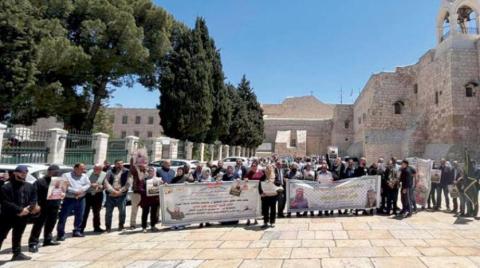
Israel arrested the governor of Jerusalem, Adnan Ghaith, a day after detaining other Palestinian officials, in a campaign aimed at closing the Palestinian institutions operating in the occupied city.
Since he took office, Gaith has been detained over 13 times, but on Thursday, Israeli authorities extended his arrest for extra 24 hours.
Tel Aviv accuses the governor of harming Israeli sovereignty in Jerusalem, posing a threat to state security, and carrying out illegal activities, in reference to his role as representative of Palestinian President Mahmoud in Jerusalem.
Israeli authorities forbid the Palestinian Authority (PA) from operating in the city, an issue of controversy and legal dispute between the two parties.
PLO Executive Committee member Wasel Abu Yousef said that recent developments in Jerusalem and all the Palestinian territories fall within the framework of Israels attempts to make the most of the hostile US position.
"Israel, in collaboration with the US, is declaring open war against the Palestinian people,” he told Asharq Al-Awsat.
Abu Yousef went on to say that since US President Donald Trump declared Jerusalem as the capital of Israel, they have been working to liquidate the Palestinian cause, adding that Trump administration is trying to legitimize the settlements, in clear violation of international law.
This, according to him, provided Israel with an excuse to act freely in Jerusalem, through a policy of "ethnic cleansing, collective punishment, settlement, and changing the landmarks of the city."
Abu Yousef stressed that the Palestinian leadership decided to move in three directions to face the US-Israeli incursion, the first at the international level, through the UN Security Council, the General Assembly of the United Nations, and the Hague Court, as well as contacting every country, organization, and institution, to take decisions aimed at protecting the legitimate rights of the Palestinian people according to law.
Secondly, taking Arab action through the Arab League and the Organization of Islamic Cooperation. It will also agree with national factions, popular organizations, civil society, and the government, to fortify its forces internally and strengthen popular resistance in the face of US attempts to liquidate the Palestinian cause.
In addition to Ghaith, Israel extended the arrest of the director of East Jerusalem Education Bureau, Samir Jibril, and the head of the parents committees in occupied East Jerusalem Ziyad Al-Shamali. It also issued a six-month closure order for the office of the Directorate of Education, Office of the Palestinian TV, and a medical center in the Old City of Jerusalem.
Israeli Security Minister Gilad Erdan confirmed the closure of offices used by Palestine TV and the Ministry of Education, adding that he will continue to pursue a firm policy against any attempt by the PA to violate "Israels sovereignty in the capital."
He accused Palestine TV of producing anti-Israel content in which the country is presented as “responsible for war crimes and ethnic cleansing.”
“A fierce battle is underway here for the future and identity of Jerusalem, and every step should be taken to thwart the P.A.’s attempts to incite residents of east Jerusalem against Israel,” said Erdan. He claimed that the Authority interferes with the education of children in east Jerusalem and to introduce inciting content into the Israeli education system.
The Secretary-General of the PLO Executive Committee Saeb Erekat refuted Israeli claims that the recent closure of Palestinian media offices in Jerusalem and republished the letter that was sent by the then Israeli Foreign Minister Shimon Peres to his Norwegian counterpart Johan Holst on October 11, 1993.
Erect said he published the letter so the Israeli can know the game of deceit their government practice on them.
In his letter to Holst, Peres confirmed that the Palestinian institutions of East Jerusalem and the interest and well-being of the Palestinians of East Jerusalem are of great importance and will be preserved.
“Therefore, all the Palestinian institutions of East Jerusalem, including the economic, social, educational and cultural, and the holy Christian and Moslem places, are performing an essential task for the Palestinian population,” he said.
Erekat also referred to a statement Peres made before the Knesset made by Peres to the Knesset on 9 September 1993, regarding Jerusalem.
Peres stated that: “Israel recognizes the religious significance of Jerusalem to all the prophetic religions. It respects its unique value in the spiritual as well as in the daily lives of Jews, Moslems, and Christians.”
He had pledged that to remain strongly committed to the absolute freedom of worship and the continuing functioning of the religious and spiritual institutions in Jerusalem.
He also pledged that Israel “shall continue to respect the various aspects of religious life in the city and will seek to broaden our dialogue with the various religious institutions.”
“We will continue to refrain from any action which may infringe upon the freedom of worship and access to the holy sites, or which may hurt the feelings and sensitivities of the various religious groups and denominations. This applies to all those who reside in the city and those who make their pilgrimage to its shrines,” Peres went on to say.
He described Jerusalem as a city of human, religious and cultural mosaics, where Jews, Muslims, and Christians live with each community preserving its cultural heritage, social patterns, and institutions, as well as its educational systems.
"The harmonious coexistence in Jerusalem depends on the continued functioning of these systems, institutions and holy sites,” he concluded.












